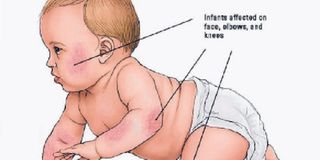Baby eczema: tips on what to expect and how to control it

What you need to know:
- By her fourth month, it got severe and itchy. Unlike traditional dry skin that would soothe the skin by use of natural oils or jelly, nothing was working for her. Upon consulting with a paediatrician, she was diagnosed with eczema.
When my daughter turned three months old, she developed dry skin patches in different parts of her body. It began with chest, thighs and knees and progressed to the arms. Like any first-time mother, I was worried as the dryness progressed and expanded over different parts of her body.
By her fourth month, it got severe and itchy. Unlike traditional dry skin that would soothe the skin by use of natural oils or jelly, nothing was working for her. Upon consulting with a paediatrician, she was diagnosed with eczema.
“Eczema is sometimes called atopic dermatitis, a skin disorder which is characterised by recurrent localised rash that may itch, ooze and case the skin to dry. It may be associated with other allergic conditions like asthma or allergic rhinitis,” explains Dr Deus Kitapondya, doctor based at the Muhimbili National Hospital (MNH).
I spoke to several mothers about this and most of them informed me that at least one of their children has been diagnosed with eczema and that I shouldn’t worry about it.
According to Dr Kitapondya, eczema in infants and toddler is common. He tells Your Health, “At least 1 in 5 babies are diagnosed with eczema but most parents don’t bother or worry because it neither hurts nor causes any serious health issue.”
As to why it occurs, Dr Kitapondya says that the source of eczema is not well established but studies have shown its relationship with heredity or genetics.
Hence the tendency to have eczema is often inherited. So your child is more likely to have it if you or a close family member has had eczema, asthma, or allergies.
“Eczema is not a life threating disorder but it may cause discomfort. Itchiness may cause scratching that can lead to cause ulceration or minor bleeding,” he says.
Besides dryness, other symptoms to look out for are: change of colour of the skin, itching, recurrent of papule-like rash on localised parts of the body like shoulders, chest, face or limbs, it may cause fever or small abscess.
My daughter was prescribed an emollient cream but I knew there had to be more I could do to soothe her skin. Here are some of the suggestions by Dr Kitapondya in order to calm a baby with extreme eczema.
1. Regular bath with warm but not hot water is recommended
2. Always keep the dry areas of the skin moist by using a moisturiser that suits the baby
3. Avoid irritants such as strong medicated soaps, perfumed petroleum jelly or powder or harsh shampoos
4. Try to identify triggers when it gets itchy and consult your paediatrician or physician with regards to alternatives
Though every baby’s eczema has different triggers such as heat, irritants, change in temperature or environment allergens (such as cigarette smoking), avoiding them will help with redness, flare-ups and itchiness. Here are some of the things that work for my daughter.
1. Avoid use of soaps and shampoos every day when bathing. Clean water does the work. The water is usually lukewarm and not hot, especially in weather like Dar es Salaam’s.
2. Don’t completely dry the skin after the bath, I leave it damp a little – then apply the emollient on the eczema prone areas. It helps with keeping it moist for a long time.
3. Apply the emollient/moisturiser at least three times in a day – the idea is to keep the skin moist all the time.
4. Cotton clothes work the best for eczema prone skin. Avoid itchy materials such as polyesters.
5. Don’t swaddle the baby to avoid over-heating – that can trigger flare-up.
6. Avoid scratching by making her wear mittens. And make sure to keep nails short.
Dr Kitapondya cautions parents to avoid self-medication or consult friends or relatives who have no idea about the condition as it can make the condition worse.
Upon asking about the cure for eczema, the doctor says eczema has no cure but it goes eventually as the child grows up. “Eczema has no cure but its spread to other parts of the body can be controlled.
The good thing with eczema is that it is not contagious and a parent can resolve spontaneously by reducing the frequency of flaring.
There are so many creams that claim to cure eczema, but remember none of them works a hundred percent.
Treatment is based on the patients presenting symptoms, nature of the skin and source of triggers, hence always consult your health practitioner first,” he adds.




